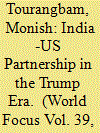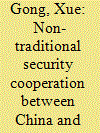| Srl | Item |
| 1 |
ID:
191833


|
|
|
| 2 |
ID:
159950


|
|
|
|
|
| Summary/Abstract |
Geopolitics is dynamic and countries respond to changes and continuities by adapting their foreign policy orientations. The Cold War period created structural constraints for India and the United States to align their interests, despite being fellow democracies.
|
|
|
|
|
|
|
|
|
|
|
|
|
|
|
|
| 3 |
ID:
193458


|
|
|
|
|
| Summary/Abstract |
In the intricate tapestr y of Indo-Pacific geopolitics, the nuclearization of the Korean Peninsula emerges as a pivotal force shaping regional dynamics and demanding nuanced strategic considerations from India. As of 2022, the region stands at a crossroads, with the evolving scenarios on the Korean Peninsula reverberating across maritime trade routes, economic hubs, and strategic alliances.The challenges posed by Korean nuclearization are multifaceted. Heightened security concerns, potential arms buildups, and diplomatic intricacies confront India with the imperative to navigate a delicate balance between safeguarding its national interests and contributing to regional stability.
|
|
|
|
|
|
|
|
|
|
|
|
|
|
|
|
| 4 |
ID:
176237


|
|
|
|
|
| Summary/Abstract |
The ‘free and open Indo-Pacific’ (FOIP) strategy, actively promoted by the United States with support from its allies and partners, is a significant geopolitical response to China's growing power and expanding influence in Asia and beyond. Beijing has adopted various new strategies to cope with the challenges related to FOIP. One of these strategies is to secure a robust relationship with south-east Asia in order to make these regional states either neutral to or less supportive of the Indo-Pacific vision. In addition to economic statecraft and soft power, Beijing believes that it can also tap into the domain of non-traditional security (NTS) to strengthen relations with this region to position itself better in the intensifying regional geopolitical competition. The article addresses the following question: what is the impact of China's NTS cooperation with south-east Asia on Beijing's geopolitical rivalry with other major powers in the Indo-Pacific region? The article argues that China's NTS cooperation with south-east Asian countries may help China maintain its geopolitical standing in the region, but it is unlikely to lead to any dramatic increase of China's strategic influence in the region. This essentially means that Beijing may be able to prevent ASEAN or most ASEAN member states from lending substantive and strong support to the Indo-Pacific construct, but it will not be able to stop ASEAN states from supporting some elements of the FOIP.
|
|
|
|
|
|
|
|
|
|
|
|
|
|
|
|